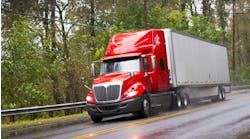The eyes of the trucking industry are on Washington as a new presidential administration begins, and a new Congress tackles federal legislation.
But already we have passed an important day: January 1, 2025. New Year’s Day. That is often when changes in state laws and regulations, made last year in 2024, become effective. You may be familiar with changes in your home state, but what about the new laws in the 49 other states and the 10 Canadian provinces? The safety and compliance of your motor carrier operation may be at stake. Fortunately, resources are available to you to learn about changes at the state and provincial levels:
- State fuel tax levels: Contact your state's fuel tax administrator (Department of Revenue or Department of Finance) or the International Fuel Tax Agreement.
- State truck registration fee levels: Contact your state's Department of Motor Vehicles or the International Registration Plan.
- State speed limits: Contact your state's Department of Transportation, any of several websites that monitor truck speed limits, such as the Insurance Institute for Highway Safety, J.J. Keller, or your state's trucking association. Remember that weather, traffic, and road conditions dictate the safe speed, and road maintenance/construction activity may temporarily limit the legal maximum speed on any road.
- State truck routes: Contact the state Department of Transportation for questions about any routing changes. If you have a terminal network, your local terminal manager can secure local details. As with truck speed limits, road maintenance and construction activity may temporarily affect truck routes.
- Toll road charges: Contact the toll roads/turnpikes where you operate, the electronic toll payment provider your company utilizes, such as PrePass Tolls or an online truck toll calculator. Remember, truck tolls can differ by time of day, truck combination type, length, and height.
See also: What are the trucking industry's goals for 2025?
If your company belongs to a state trucking association, the American Trucking Associations, or the Owner-Operator Independent Drivers Association, take advantage of the professionals each association employs that are ready to help answer your questions.
The state police may also be contacted. When I served with the California Highway Patrol, I truly appreciated calls from safety-conscious fleet managers and truck drivers asking what was new. When it comes to truck safety and compliance, we are all on the same page.



